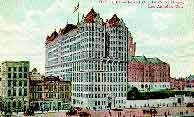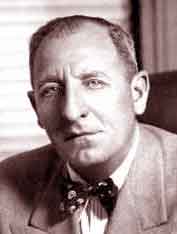“Hush, now, play quietly,”my mother said. “Daddy’s on the radio. I want to hear it.”
“Me, too! Me, too!” I was four years old.
The voice poured from the big radio speaker and filled the room. It sounded like Daddy, but it wasn’t saying, “Hi ya, big guy!” It was just talking, talking, talking, talking. No fun.
I went back to my toy cars on the bare wooden floor. But I tried to be quiet with them.
More than sixty years later, I found this radio script, dated July 1936. Oh, maybe it wasn’t the same one I had heard when I was four, but perhaps it was. It was my father, Charles Harris (Brick) Garrigues, talking. He spoke over radio KRKD; the antenna is still a landmark in downtown L.A. [Photo by Sal Garcia for the L.A. Radio site.]

Good evening: Tonight I’m going to break down, put my feet on the pressroom table and try to give you a very brief picture of the inside of one newspaperman’s life.
I sometimes think I must have been the most naive newspaperman in the world when I started in on this sort of work. My first assignment was the San Gabriel Dam case, and I went into that investigation — six years and two weeks ago today — with the sincere, earnest conviction that all we had to do was to prove wrongdoing in connection with that five-million-dollar fiasco and those responsible would automatically be punished.
You all know how that case ended. One supervisor was convicted of bribery and went to prison. The contractors only last week agreed to return $737,000 — every penny of the money obtained by means of the bribe. A new flood control administration was set up and the county flood control district is being capably administered for the first time in many years.
I am glad that I have been to any degree instrumental in getting back for the taxpayers three-quarters of a million dollars which was hopelessly lost to them. But to me that money is of little importance — the thing that stands out about those six years is the fact that in that time I have come into contact with a fact so momentous, so horrible to those who believe in democracy, that even yet I can scarcely believe the evidence of my own senses.
When I started to work on the San Gabriel Dam case, I must have believed that our government was operated very much as we had been taught in high school civics.
True, I had heard many stories about graft in office. But I never believed, never suspected, that graft constituted both the fuel of our governmental machinery and the product of the machine. I never suspected politics was a sort of perpetual-motion machine which not only made its own fuel but enriched its operators in the process. I never suspected that graft was the rule, rather than the exception, in government.

Between l930 and l936 stand six years of hard work — work down in the sewer of practical politics. In those years I discovered that those peanut politicians up at the Hall of Records were pikers. I discovered that while we had been worrying about the few millions they had stolen, the real politicians had stolen our government itself.
It was when I began to realize those things that I started to do something about it. The old “Spotlight” was born [his political column in the Los Angeles Illustrated Daily News]. I took service with the l934 Grand Jury in the hope that — some way — we could remedy conditions. And it was then that the problem began to become personal — I learned from actual experience how little one’s life was worth when the forces supposed to enforce the law had been taken over by gangsters.
That realization came first one morning as I stepped into a courtroom in the Hall of Justice. It was Saturday and the room was empty, but in the inner chambers sat five Superior judges, waiting for certain documents they had asked me to bring them.
As I entered the room, two detectives — investigators from the district attorney’s office — leaped upon me. I knew them — and I don’t mind saying I was scared — scared to death. One was the official strong-arm man of the office — only a few months earlier he had come within an ace of killing an Examiner reporter with his feet.
You think fast when you’re scared — and I was scared. I didn’t know whether I was to be killed, beaten up or just robbed of the evidence I was carrying. I had no desire to be kicked where the Examiner man had been kicked. If I ran, I knew, I’d be shot — and there would be a fantastic story of my attempting to escape arrest. So I stood back and took it — giving a few myself. Fortunately, the strong-arm guy wore a heavy ring which cut my face so that I bled a lot and looked worse off than I was. For that reason, I suppose, the guy with the black-jack didn’t use it — and I got off easy.

I guess I scared the five judges to death when I staggered late to their meeting — blood-covered, clothing torn, hair matted. They, too, realized there was nothing the august and dignified judges of the Superior Court could do about it.
And it had dawned on me, too, as I stood by an open window and watched that man circling me with a black-jack, that there was nothing anybody could have done about it if they had laid me cold with the sap and then tossed me out the window. It would have been an accident — pure and simple. I resolved then never to get near an open window while my friends from the D.A.’s office were around.
That decision stood me in good stead five or six months later. Again I was in the Hall of Justice on a Saturday afternoon and again I ran into my friend, the strong-arm man, on the eighth floor. It was that time I found what death looks like in the afternoon.
My friend, it seems, was argumentative, and not quite friendly. He wanted to talk — and he wanted to talk directly beside the stairway leading downward from the eighth floor.
That’s a peculiar stairway. For some reason, a space of some four feet has been left between the tiers of steps so that a falling body would drop a full six stories before striking stone or concrete. And my good friend wanted me to talk above that seventy-two-foot hole.
Of course, I didn’t. We were alone on the floor and I knew by this time that should I tumble over — accidentally like — my friend could prove by nineteen fellow detectives that he was exactly a mile away at the time.
And then he did a startling thing. He grabbed me and forced me over to the rail, trying to bend me back over the hole. I could have cried out — but I wouldn’t have been heard. And as we fought there, silently, an elevator came to the top and he stepped back. We walked away while he whispered in my ear all the ways he was going to take me apart if he ever caught me alone again.
I think you can see why I believe we need a change in the district attorney’s office. Perhaps I’m stressing the personal angle a little too much — but I know that it could happen to you — or to anybody who tries to break the hold of gangsterism in Los Angeles.
I had reached this point in preparing tonight’s talk this morning when an almost incredible thing happened. A friend of mine, a newspaperman named Herb Stutz, walked into the office. Around his head was a bandage. His eye was blackened. Three broken ribs were taped up.
Stutz also had been active in the campaign against gangsterism in the district attorney’s office. And last night he had become careless.

During the day he had attended a picnic in the Verdugo Hills and had passed out copies of the People’s Progress and other literature telling what was going on in the district attorney’s office. Also at the picnic was Mr. Buron Fitts [the district attorney, pictured at right], making a campaign speech.
On the way home, Stutz drove down a dark road. A car swung up beside him and forced him to the curb. Two men leaped out, dragged him from the car, kicked and beat him into unconsciousness. When he woke up they were gone.
Suppose I had gone tumbling over that rail. Suppose the blackjack used on Stutz had been swung just a little harder? What could anybody have done about it? Who would have prosecuted the murderers? The district attorney? Hardly.
There are dozens of other cases — more serious cases — which I could tell you about if I had the time. Men beaten; in some cases, men murdered. Nothing done. Verdicts of suicide. Verdicts of accidental death.
Only you can stop these things. You can stop them August 25 by electing a new district attorney — one who is not gang controlled; one who believes the law was made for the people.
You can help to stop them by reading the People’s Progress, ![]()
listening to theater talks and then telling your friends about them.
If you’d like a sample copy of the People’s Progress containing this talk, just drop a postcard to me in care of this station — KRKD, the Daily News station, and it will be sent to you. And don’t fail to listen in again next Monday night at the same time.
Years later, a Los Angeles cop wrote about Brick Garrigues
This is the man whose ears were knocked down by Tom Cavett in 1936.
Age 30 – 6 ft. 2 in. 195 lbs. Red sandy hair. Unscrupulous writer.
Usually lives with a female.
Not active lately.